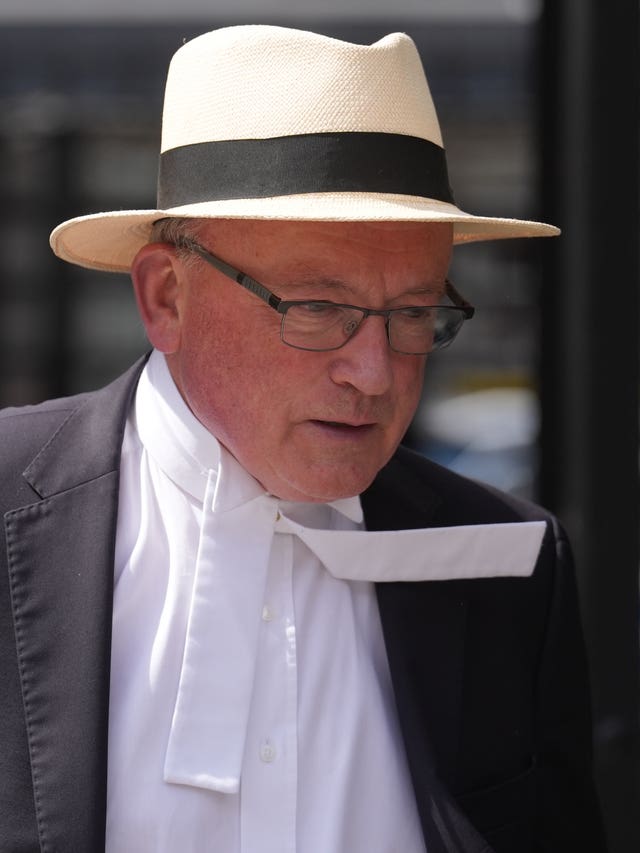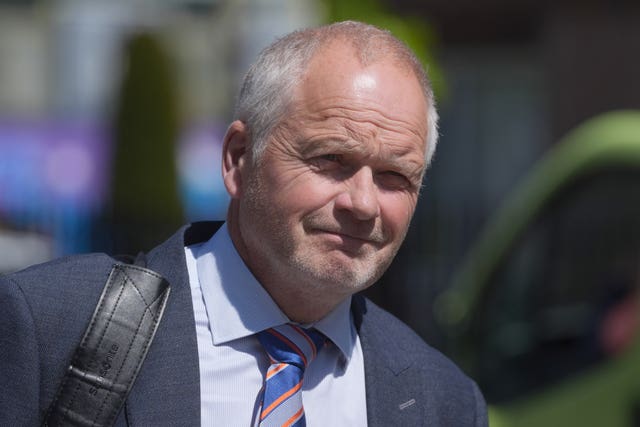Mr Adams is suing the BBC over a claim made by a source in a documentary that alleged he had sanctioned the killing of a former Sinn Fein official.
Gerry Adams had a reputation as a “warmonger” and “peace taker”, advocates with victims’ groups have told the jury in a libel action taken by the former Sinn Fein president against the BBC.
Mr Adams is suing the BBC over a claim made by a confidential source in a Spotlight documentary that alleged he had sanctioned the killing of a former Sinn Fein official who turned out to be an informant.
In the programme, an anonymous source claimed that the shooting of Denis Donaldson was sanctioned by the political and military leadership of the IRA and that Mr Adams “gives the final say”.

He denies any involvement in the killing and has denied being in the IRA.
Ann Travers, an advocate with the victims’ group the South East Fermanagh Foundation (SEFF), said Mr Adams had a reputation as someone “very heavily involved with the murder of innocent people” and being a “senior member of the IRA”.
Ms Travers explained to the jury at the High Court in Dublin that her sister Mary was killed by the Provisional IRA in an attack in which her father Tom Travers, who was a lawyer who became a magistrate in 1979, was also shot six times.
Mr Travers survived and returned to work years later.
Asked by Eoin McCullough SC, for the BBC, about the perception of the public of Mr Adams, Ms Travers said: “His reputation would be one of having been a warmonger.”
Asked to explain the reason for this, she replied: “For the Troubles, supporting the IRA and the murder of innocent people.”
Under cross-examination from Declan Doyle SC, for the plaintiff, Ms Travers said Mr Adams had “cast a long and dark shadow” over her life since 1984.
She said: “I would even have a fear of him.”
Ms Travers added that many people in Northern Ireland are still scared and afraid of what they can say in case they are threatened.
The witness said that whenever she criticises senior Sinn Fein figures, especially Mr Adams, she is attacked, trolled and threatened.
“I have had death threats about it,” she said.
Mr Doyle put to Ms Travers that Mr Adams’ reputation was overwhelmingly of a peacemaker, to which she said she would disagree and said the first person she thinks of in that respect in Northern Ireland is John Hume.
Asked if Northern Ireland is now comparatively more peaceful, she said: “Of course we should all be grateful we’re not getting murdered any more.”
She added: “Thank you to Mr Adams for people being able to go to work and the IRA not murdering people.”

Ms Travers acknowledged that Mr Adams “was part of” peace efforts but said he was “yet to do anything” for victims’ groups such as the SEFF.
Mr Doyle said Mr Adams worked with the Relatives for Justice group.
Ms Travers accused Mr Adams of working with groups that were biased towards republicans.
She said: “He doesn’t do anything for people like me. In fact, he condones what happens to us – that is why his reputation is as such that he is a warmonger.”
Ms Travers added that it was “a joke” when Mr Adams talks about being a peacemaker or denies being in the IRA.
She said that he had “lied consistently” about being in the IRA.
Ms Travers added: “I’m delighted that Mr Adams decided to turn away from the Armalite.”
The BBC also called Northern Ireland solicitor Trevor Ringland as a witness.
Mr Ringland is a former Ireland rugby international who was born to a police family in West Belfast in 1959.
He said his father had been shot by the IRA in North Belfast.
Mr Ringland said he worked with victims’ groups in the Republic of Ireland and Northern Ireland.
Asked by Paul Gallagher SC, for the BBC, for the public’s perception of Mr Adams, he replied: “He is seen as a peace taker, not a peacemaker.”
Under cross-examination, Mr Doyle said the response was a soundbite and asked Mr Ringland if he made it up.
The witness replied that it was not a soundbite and added: “I think the vast majority of people in Northern Ireland would regard him as a peace taker.”

Mr Ringland said people welcome that violence has stopped but it should not be the case that you thank somebody for stopping something they should not have been doing in the first place.
“It is sucking the grace out of our society,” he said.
Asked by Judge Alexander Owens if he believed someone’s reputation can change, Mr Ringland said he did but added: “I think Mr Adams’ reputation has not improved.”
He said the former Sinn Fein president “messes with people’s minds”, adding: “His reputation is as someone who stepped away from the violent past and is now promoting his constitutional preference through other means.
“There is still hatred at the core of that reputation – he is not aiding reconciliation in Northern Ireland.”
Mr Doyle asked Mr Ringland if he had been the vice chairman of the Ulster Unionist Party East Belfast branch and had run as a candidate for the party in 2010.
He said this was right but that he had subsequently left the party in protest against the leader saying he would not attend a GAA match.
Asked if he then joined the “all-inclusive Northern Ireland Conservative Party”, Mr Ringland said he had and had later campaigned for a Labour politician.
He said: “I would like to see politics based around social issues rather than politics based around waving a flag.”
The trial continues.

